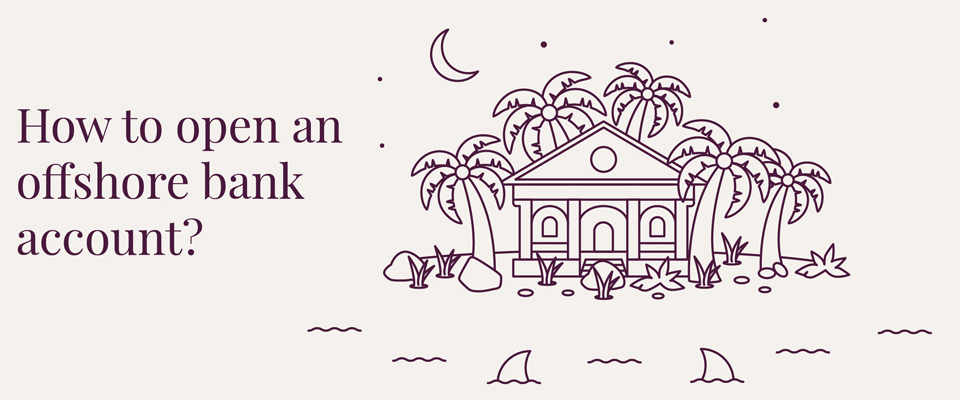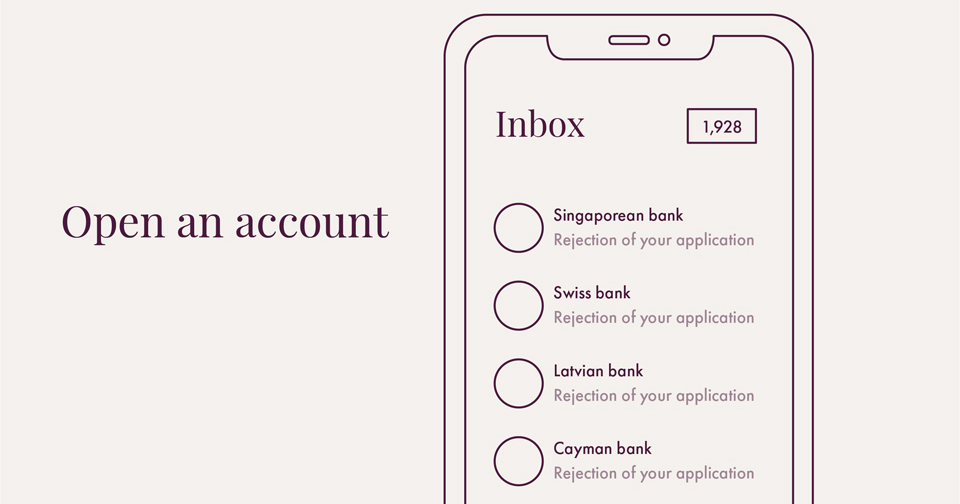How To Open An Offshore Bank Account?
Published October 12th, 2020. By Gediminas Butkus

Offshore banks are often perceived as financial institutions based in a tax-haven, usually a tropical island, and serving high-risk customers.
However, the reality is a bit different. From the customer perspective, it is a bank based outside the customer's home jurisdiction that welcomes international clients.
There are several reasons why you might need an offshore bank account. The most common one is asset protection and diversification, especially if you live in a politically unstable country.
It is also a go-to solution for offshore companies and various special purpose entities such as trusts, holding companies, and limited partnerships.
In general, offshore banks are international banks offering services you cannot get at your local bank. In this article, we will take a closer look at the process of opening a bank account at one of the offshore jurisdictions, such as the British Virgin Islands or Puerto Rico.
 Road Town, the capital of the British Virgin Islands
Road Town, the capital of the British Virgin IslandsChoosing a bank that fits your profile
If you find yourself in a situation where you require an offshore bank account, you have to find an offshore bank which suits your needs.
There is a number of factors to consider when searching for a bank, such as jurisdiction, acceptance policy, offered products, minimum deposit requirements, and others.
There is no one-fits-all solution. While some banks are superior at wealth management or structured products, others are much better as safe havens for asset protection.
Jurisdiction of the bank is one of the main things to take into account. It might come as a surprise, but even offshore banks tend to serve clients from nearby countries. For example, despite the bank offering remote account opening possibility, sometimes you might need to visit the financial entity in person for a consultation. Furthermore, document exchange with a bank from the same region would be much quicker. Thus, it is always worth considering banks in the nearest countries first.
The reputation of the bank’s jurisdiction is also significant. You should consider it in regards to the financial sector stability, as well as security of your funds. Things to take into consideration include regulation of the financial market, political stability, perception by international organisations and other financial centres.

It is critical to evaluate how the jurisdiction is perceived in your home country or the country where your business is located. Sometimes having a bank account in high-risk jurisdiction might raise unnecessary red flags when passing compliance procedures at your local financial institution.
What is more, it could be costly not to consider the existing and possible future relationships between the bank and your home country. For example, a convention on the enforcement of judgements between the jurisdictions might weaken your asset protection. At the same time, a bilateral information exchange agreement, such as the Common Reporting Standard (CRS), could eliminate your privacy.
Lastly, it is worth noting that offshore banks differ by their client profile. Some only work with wealthy individuals or, in more extreme cases, with a limited number of private family offices. Other banks may only serve corporate clients or focus solely on specific industries, such as maritime, logistics or mining.
Traditional international banks specialise in conventional business sectors, such as export and import enterprises, transportation companies or investment firms. Offshore banks, on the other hand, are opening accounts for new-era digital companies, such as affiliate networks, gambling and e-sport businesses or crypto exchanges.
What services do offshore banks offer?
While high-street banks usually act as one-stop shops for most financial products, offshore banks offer a smaller spectrum of services.
Some banks are only providing full-reserve current accounts, meaning that they are not paying any interest on deposits but are also not issuing any loans.
Typically, offshore banks are also offering trading and wealth management services, as they have a clear edge to provide a broader spectrum of financial products than banks in highly regulated markets.
Such entities are usually based in traditional financial centres, such as the Cayman Islands, Bahamas or Singapore, where they can hire experienced portfolio managers.
Not all offshore banks provide a possibility of multi-currency accounts. The accounts are usually denominated in mainstream currencies such as the US dollar, euro or pound. If you require an account in one of the more exotic currencies, your options might be limited.

Furthermore, not all banks are offering debit or credit cards. So, if it is something you require, you should consider it as well before applying for an offshore bank account.
Usually, offshore banks require a minimum deposit to open an account. The deposit can range from several thousand dollars to half a million dollars or more, so make sure to check it before applying.
It is worth mentioning that sometimes non-bank financial institutions might do the job better and cheaper. For example, if you are looking for a current account, a payment institution might be the perfect solution for you. However, if you are planning to trade securities and other financial products, an account at an online broker would probably serve as a better option.
Offshore banks providing certain services can be as rare as unicorns. For example, if you are looking for a high-risk merchant processing solution, it is more likely to find an acquiring bank in a country which is not perceived as high-risk.
Getting on board
After you have decided which bank to approach, you should do your best to make an excellent impression on the financial institution. Because of the past stigma, offshore banks are extremely cautious when choosing their clients, so you have to prove yourself a fitting customer for the bank.
This sad reality is the result of de-risking, a practice when banks are rejecting legit but riskier clients as serving such clients would worsen the bank’s image against partnering financial institutions and regulators.
Usually, bank compliance teams are busy and do not like to play cat and mouse with the client, as it could raise the onboarding costs enormously. Hence, to increase your onboarding chances, it is vital to prepare a package of legalised (with an apostille) up-to-date documents that explain the full picture of your business, including ownership structures, source of wealth, source of funds, and more.
It is recommended to prepare a memo summarising your situation and explaining the purpose of each provided document together with the application.
In most cases, the bank will come back to you with some follow-up questions. You have to clearly understand what the bank is requesting. For example, you should understand the difference between the source of wealth and the source of funds. Try to answer these questions as thoroughly as possible to reduce the need for further questions.
The process is a lot easier with an introducer
Both of the steps mentioned in this article are largely time-consuming and can take months to complete, especially if you apply to banks one by one. That is why offshore banks usually prefer introducers.
As the introducers have already gone over the account opening procedure several times and do not require any guidance with the application forms or collection of supporting documents, they can save the bank a lot of time and resources. Furthermore, because of previous experience, the introducer can help you tailor the application to your needs, as well as help the client collect the required documents.
You can consider introducers as car dealers who help you sell your car by cleaning it, fixing minor defects and offering it to potential buyers. On the other hand, they work as consultants to provide you with the best solution, similar to insurance brokers providing you with the best insurance policy.

Usually, introducers are lawyers or specialists in offshore company formation. They can improve your existing corporate structure or develop a new one to make sure your business is accepted by the bank.
Because of their previous experience, introducers usually have informal relationships with financial institutions and can help make the process of opening an offshore banks account much easier. They can find out if the bank is willing to proceed with your application very quickly to avoid wasting everyone’s time.
Using an introducer significantly increases your odds to get accepted at the bank, as well as saves an incredible amount of time.
Introducers like Gediminas Butkus of Offshore Bank Accounts can help clients with the whole account opening process, from searching for the best solution to preparing the application and communicating with the bank.
If you are considering opening a bank account in an offshore jurisdiction, you should visit their website https://offshorebankaccounts.com or contact Gediminas personally via email hello@offshorebankaccounts.com
